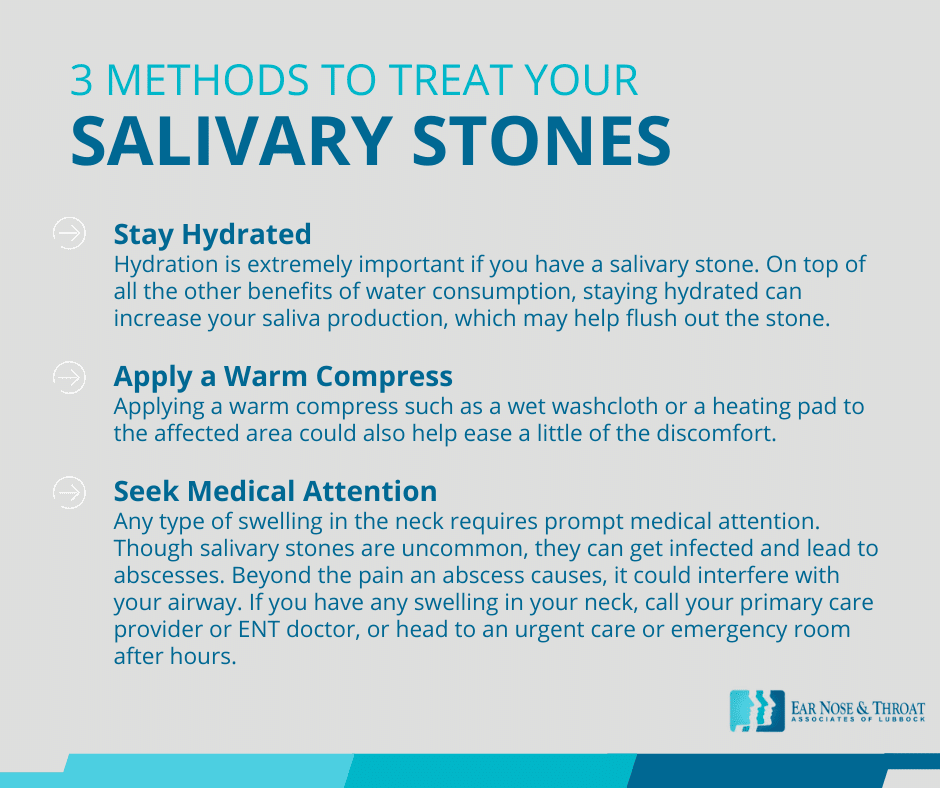Salivary Stones: Causes, Symptoms and Treatment

You’re going about your day, and everything seems great. You’re checking things off your to-do list, feeling accomplished, and about to conquer the next item on your agenda.
Then, out of nowhere, you notice a lump in your upper neck. You wonder if you’re fighting off a virus, if this is a swollen lymph node. You sit down to eat and notice the lump becoming a lot more painful.
A little later, some pus starts draining into your mouth, and the floor of your mouth aches.
What’s going on? Is this a virus? Some kind of rapidly growing neck tumor?
Actually, chances are good that you’re dealing with a salivary stone.
Salivary Stones? What Are Those?
To understand what a salivary stone is, let’s first take a quick look at the salivary system.
The Salivary System
Salivary glands produce saliva to help moisten the mouth and digest food. There are three sets of salivary glands that empty saliva into the mouth through thin tubes called salivary ducts.
It’s possible to develop a salivary stone in any of your salivary glands or ducts. But the submandibular gland is more susceptible to developing stones than the other salivary glands.
The two submandibular glands are located just under your jaw, in your upper neck. They’re toward the back of your mouth and about the size of a walnut.
The submandibular gland sends saliva to your mouth through a duct called Wharton’s duct, which has to run upward, fighting against gravity. This means the saliva doesn’t always flow effectively and can more easily develop salivary stones.
The saliva running through Wharton’s duct can also be a bit thicker than the saliva from your other glands, making it more prone to developing stones.
How Do Salivary Stones Form?
Salivary stones, also called sialoliths or salivary duct calculi, are mostly made up of inorganic matter. This matter commonly includes phosphate, calcium and magnesium. The stones vary widely in size and can measure anywhere from 2 mm to about 1.5 cm in diameter.
Salivary stones can remain in the salivary gland, or they can break off and completely block the duct. In some cases, the blockage can cause an infection and result in an abscess.
Initial symptoms of salivary stones usually begin with swelling in the upper neck. Pain may follow, as well as swelling in the mouth. Pus may drain into the mouth through the salivary duct, as well.
If the blocked duct becomes infected, these symptoms will escalate. Further symptoms could include fever, fatigue, and an incredible amount of pressure and pain from the swelling.
What Causes Salivary Stones?
Unfortunately, we don’t always know what causes a salivary stone to form. Some people seem to be more prone to them than others, possibly because of salivary ducts that are a little more narrow than most.
Dehydration or lack of nutrition could also play a role, since either can cause decreased production of saliva.

Salivary Stone Treatment
You can take several steps at home to help you find relief from the pain and swelling.
Stay Hydrated
Hydration is extremely important if you have a salivary stone. On top of all the other benefits of water consumption, staying hydrated can increase your saliva production, which may help flush out the stone.
It may help to include a little lemon juice in your water to stimulate even more saliva.
Apply a Warm Compress
Applying a warm compress such as a wet washcloth or a heating pad to the affected area could also help ease a little of the discomfort.
Seek Medical Attention
Any type of swelling in the neck requires prompt medical attention. Though salivary stones are uncommon, they can become infected and lead to abscesses. Beyond the pain an abscess causes, it could also interfere with your airway.
If you have any swelling in your neck, call your primary care provider or ENT doctor, or head to an urgent care or emergency room after hours. A dentist might also be able to help in this situation, since dental abscesses can have some of the same symptoms.
Medical care for salivary stones can vary, and may include any of the following:
- X-ray or CT scan. Imaging can help guide your provider in deciding on the best medical care for your situation. Your doctor will want to make sure that the salivary stone blocking your duct isn’t from a larger stone in your salivary gland. If there is an underlying health problem causing the salivary stone, that could be identified through x-ray as well.
- Massage of the affected gland. Sometimes massaging can help to work the salivary stone loose from the opening of the duct. We don’t recommend trying this without expert direction from a doctor. (The gland is usually very tender, too, so this likely won’t be a pleasant experience!)
- Antibiotics. You may receive an antibiotic prescription to treat or prevent infection in the salivary gland and duct.
- Stone removal. Sometimes your healthcare provider can remove the stone through gentle massage. At other times, they’ll need to make a small incision in the salivary duct to extract the stone. Though it sounds painful, this will help to relieve the pain and pressure buildup by letting the pus and fluid drain out of the salivary duct.
- Gland removal. Extreme cases in which salivary stones recur frequently may require the removal of the affected salivary gland.
Your Next Steps if You Think You Have a Salivary Stone
You can’t plan for an interruption like a salivary stone. But at least you can have a solid plan for what to do next.
If you experience any swelling in your neck, seek immediate medical attention. Otherwise, if you think you might have a salivary stone, give ENT Associates of Lubbock a call. We have experience with salivary stones and many other ENT health concerns. We can assess your salivary glands and order any further testing or treatment you need.
Dr. Scolaro is a board-certified Otolaryngologist servicing the South Plains area. He has been practicing in Lubbock since 1990 and has earned a reputation as a skilled and experienced surgeon. He currently serves as the Medical Director for Covenant High Plains Surgery Center campuses, is a member of Covenant Health Partners and is an adjunct faculty professor for Texas Tech University Health Sciences Center School of Medicine. Learn more about Dr. Scolaro.
Categories:








